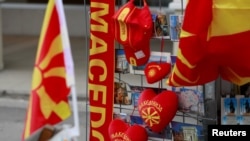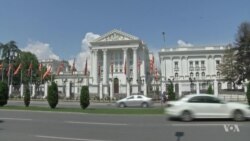Just days after the European Union laid out a membership roadmap for six Balkan states, Macedonia appears to be on the cusp of resolving the 27-year-old diplomatic impasse with neighboring Greece, but some experts fear fringe voices on both sides of the border could undermine a rare breakthrough in negotiations.
Greece and Macedonia have been feuding over who gets to use the name since Macedonia’s independence from Yugoslavia in 1991. Many Greeks say allowing the neighboring country to use the name insults Greek history and implies a claim on the Greek territory also known as Macedonia — a key province in Alexander the Great’s ancient empire.
WATCH: Macedonia Proposes Geographical Name Change to End 25-Year Dispute with Greece
As a result, Greece has blocked Macedonian efforts to join the EU and NATO. Despite recognition by 137 countries, Macedonia is officially known at the U.N. as the former Yugoslav Republic of Macedonia, or FYROM.
Davos pledge
Following a pledge at the 2018 World Economic Forum in Davos to rapidly resolve the dispute, Macedonian Prime Minister Zoran Zaev on Tuesday said his country is ready to add a geographical qualifier to its name and officially rechristen the main airport and a key highway, which had both been named after Alexander the Great.
Although Greek President Prokopis Pavlopoulos has indicated he’s prepared to accept a composite name that is clearly distinct from Greek Macedonia, both presidents now have to persuade their respective constituents across the political spectrum to support the initiative.
In northern Greece, hundreds of thousands of people demonstrated against any solution that would include the word “Macedonia,” while many officials in Athens appeared to welcome moves toward resolving the impasse.
In Macedonia, a recent survey by the Skopje-based Institute for Democracy, Societas Civilis, indicates majority support for modifying the country’s name if it expedites and enhances prospects for NATO and EU membership.
Macadonian diaspora
Macedonians living abroad, however, are less enthusiastic, says Meto Koloski, president of the United Macedonian Diaspora, whose organization has called on Skopje to pull out of negotiations completely.
“There is Republic of Macedonia, and there is a province known as Macedonia. If they want to rename Greek Macedonia, I don’t think anybody would dispute that,” he told VOA’s Macedonian Service.
“Clearly someone is trying to stir the pot in Greece,” he added, referring to the size of the protests in Thessaloniki, Greece’s second-largest city and capital of the Greek administrative region of Central Macedonia. “I don’t know if it is some Russian involvement or domestic political issues they’re facing, but ... 137 [countries] have recognized Macedonia, so public opinion is on Macedonia’s side.”
Russia meddling?
SAIS-Johns Hopkins conflict resolution expert Daniel Serwer, however, isn’t so quick to dismiss the prospect of a deal.
“There is a real possibility of some sort of agreement” between the countries, he said, adding that “Russia is doing everything it can to block NATO membership in the Balkans.”
EU efforts to reassert its power in the Balkans coincide with growing regional influence from Moscow — and Turkey and Beijing — along with Western concerns that ongoing civil unrest over domestic issues could rekindle local conflicts.
The 2015 migrant crisis brought home the strategic importance of the Balkans region, when hundreds of thousands of asylum-seekers traveled through the region to try to reach western Europe. Tens of thousands of migrants are still stuck in the Balkan states.
Strategic Balkans
In Washington, Senator John McCain, the Arizona Republican, and others have called for a substantially strengthened U.S. commitment to the Balkans, warning that Western nations ignore it at their own peril. In 2017, the Washington-based Atlantic Council issued a report calling for a permanent American military presence in the Balkans to fortify southeastern Europe against malign foreign influences.
Beyond high-level geopolitics, however, SAIS’s Serwer, a former U.S. diplomat, had some plainspoken advice for opponents of the deal on the ground in Skopje and Athens.
“I don’t have any doubt about my American identity, and it doesn’t bother me at all that Mexico is called Estados Unidos Mexicanos, and it doesn’t bother Mexicans that we have a state named New Mexico,” he said.
“If you are confident of your own identity, nobody can take it from you,” he added.
Although the European Commission has stated that it will not try to influence UN-led talks to find a solution to the long-running name dispute, Jean-Claude Juncker is due to visit Skopje by the end of the month as part of a push to reinvigorate Macedonia’s membership ambitions, along with that of Serbia, Montenegro, Albania, Bosnia, and Kosovo.
This report was produced in collaboration with VOA’s Macedonian Service.







